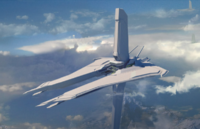Maneuver drive: Difference between revisions
From Halopedia, the Halo wiki
No edit summary |
m (Text replacement - "\|(right|thumb)(\|[^\]\n]+)?\|(right|thumb)" to "|thumb$2") |
||
| (One intermediate revision by one other user not shown) | |||
| Line 1: | Line 1: | ||
{{Status|Canon}} | {{Status|Canon}} | ||
{{ | [[File:H2A_In_Amber_Clad_intercept.png|thumb|300px|{{UNSCShip|In Amber Clad}} using its fusion maneuver drives to perform an intercept on the {{Pattern|Syfon|assault carrier}}, ''[[Solemn Penance]]''.]] | ||
A '''maneuver drive''' is a propulsion system used on starships, for the purposes of sub-light travel. For faster-than-light travel, starships must transit the medium of [[slipstream space]] via usage of a [[slipspace drive]]; maneuver drives do not allow for slipspace transit, nor do slipspace drives allow for realspace maneuvering. All forms of maneuver drives convert energy into thrust, augmented with a reaction mass, however different types of maneuver drives will perform this using different mechanisms.{{Ref/Book|HWF|Page=14}} | |||
==Types of maneuver drive== | |||
===Human=== | |||
{{Main|Fusion drive}} | |||
Starships employed by [[human]]ity typically employ [[Fusion reactor|fusion]] rockets, capable of generating both the ship's electrical power and thrust. These systems eject hot [[plasma]] from their exhausts which can be extremely hazardous to anything caught in its wake, but is made up for by the mobility offered by the system (especially when used in conjunction with inertial compensation to minimise the effects of rapid acceleration and maneuvering). Human ships generally employ a mix of high-thrust and high-efficiency to balance the consumption of reaction mass in different stages of a journey. For more delicate and slower movements, [[human starship]]s will use chemical rockets.{{Ref/Book|Enc22|Page=114}} Such chemical rockets may also be built into the hull as one-use [[emergency thruster]]s. | |||
=== | ===Covenant=== | ||
The [[Covenant]] use reactionless drives for their [[Covenant starship|starships]], which are able to move their respective vessels without generating an exhaust of hot gases. The most impressive of their maneuvring systems are [[repulsor engine]]s, which used stacked tidal [[Anti-gravity technology|antigravity]] generators to to "push" or "pull" the ship in a given vector. These systems are able to function in atmosphere and in space and maintain a thrust-to-mass ratio outmatched only by the technologies of the Forerunners.{{Ref/Book|Enc22|Page=223}} | |||
Covenant heavy [[Space fighter|strikecraft]] and [[Dropship|shuttlecraft]], and lighter Covenant spacecraft, utilise [[impulse drive]]s; a form of drive powered by a small-scale [[pinch fusion reactor]] and capable of both atmospheric and space flight.{{Ref/Book|Enc22|Page=218}} | |||
===Forerunner=== | |||
[[File:Enc22_Skydock.png|thumb|Forerunner [[skydock]]s made use of torsion plates for in-atmosphere maneuvring.]] | |||
{{Main|Torsion plate}} | |||
The [[Forerunner starship|spacecraft]] of the [[Forerunner]]s utilise a form of inertialess drive technology known as [[torsion plate]]s, which convert harvested energy into thrust via way of emitting [[torsion field]]s.{{Ref/Book|Enc22|Page=338}} They are also known to have used a form of propulsion system known as a [[reaction drive]] - though what a reaction drive entails is unclear. | |||
The impulse drives of the Covenant were originally descended from Forerunner equivalents. | |||
==Sources== | ==Sources== | ||
Latest revision as of 11:57, April 12, 2023

A maneuver drive is a propulsion system used on starships, for the purposes of sub-light travel. For faster-than-light travel, starships must transit the medium of slipstream space via usage of a slipspace drive; maneuver drives do not allow for slipspace transit, nor do slipspace drives allow for realspace maneuvering. All forms of maneuver drives convert energy into thrust, augmented with a reaction mass, however different types of maneuver drives will perform this using different mechanisms.[1]
Types of maneuver drive[edit]
Human[edit]
- Main article: Fusion drive
Starships employed by humanity typically employ fusion rockets, capable of generating both the ship's electrical power and thrust. These systems eject hot plasma from their exhausts which can be extremely hazardous to anything caught in its wake, but is made up for by the mobility offered by the system (especially when used in conjunction with inertial compensation to minimise the effects of rapid acceleration and maneuvering). Human ships generally employ a mix of high-thrust and high-efficiency to balance the consumption of reaction mass in different stages of a journey. For more delicate and slower movements, human starships will use chemical rockets.[2] Such chemical rockets may also be built into the hull as one-use emergency thrusters.
Covenant[edit]
The Covenant use reactionless drives for their starships, which are able to move their respective vessels without generating an exhaust of hot gases. The most impressive of their maneuvring systems are repulsor engines, which used stacked tidal antigravity generators to to "push" or "pull" the ship in a given vector. These systems are able to function in atmosphere and in space and maintain a thrust-to-mass ratio outmatched only by the technologies of the Forerunners.[3]
Covenant heavy strikecraft and shuttlecraft, and lighter Covenant spacecraft, utilise impulse drives; a form of drive powered by a small-scale pinch fusion reactor and capable of both atmospheric and space flight.[4]
Forerunner[edit]

- Main article: Torsion plate
The spacecraft of the Forerunners utilise a form of inertialess drive technology known as torsion plates, which convert harvested energy into thrust via way of emitting torsion fields.[5] They are also known to have used a form of propulsion system known as a reaction drive - though what a reaction drive entails is unclear.
The impulse drives of the Covenant were originally descended from Forerunner equivalents.
Sources[edit]
- ^ Halo: Warfleet, page 14
- ^ Halo Encyclopedia (2022 edition), page 114
- ^ Halo Encyclopedia (2022 edition), page 223
- ^ Halo Encyclopedia (2022 edition), page 218
- ^ Halo Encyclopedia (2022 edition), page 338